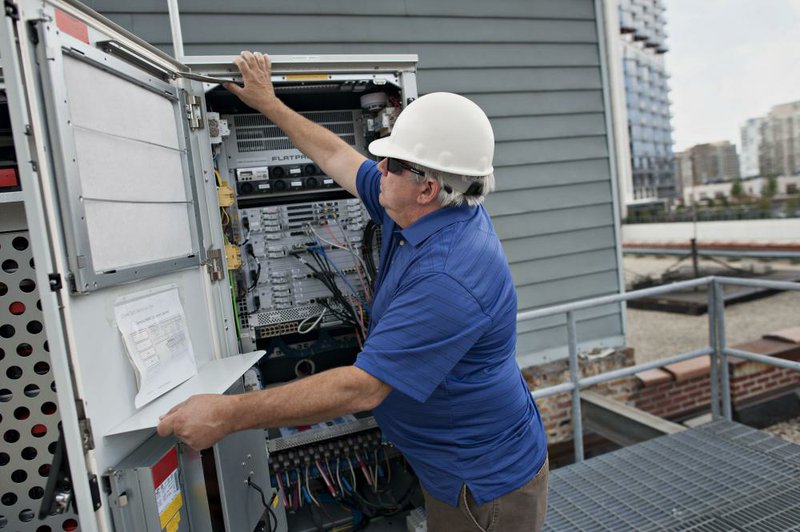The U.S. government will reveal as soon as this week which companies want to bid on airwaves in the next multibillion-dollar spectrum auction.
Not only has cash-tight Sprint Corp. declined to join, but rich outsiders such as Google Inc. are also sitting this one out. If no surprise bidders emerge to drive up prices, carriers may be able to grab valuable wireless space at a bargain after the record $41 billion they paid in an auction last year.
"Enthusiasm for spectrum has cooled," said Tim Farrar, an analyst with Telecom Media Finance Associates.
Three of the four major wireless companies -- AT&T Inc., Verizon Communications Inc. and T-Mobile US Inc. -- plan to take part. Dish Network Corp. said it will "potentially participate" and Comcast Corp., the cable provider that has twice flirted with entering the wireless business, has signed up for the auction, which is scheduled to start March 29.
To provide wireless carriers with the ability to deliver more cat videos and highlights of NBA basketball star Steph Curry to smartphones, the Federal Communications Commission is asking TV broadcasters to hand over airwave licenses in exchange for cash. To raise the money, the agency is selling the wall-penetrating, low-frequency radio waves to investors and carriers seeking more capacity to handle an increasing flood of mobile-video data.
As the auction nears, predictions on the total take have been falling. The FCC's initial calculation in 2014 implied as much as $45 billion in proceeds. A survey of eight analysts by Bloomberg in January provided an average of $33 billion. Last month, a note from Wells Fargo Securities said some estimates were running as low as $15 billion.
The FCC hasn't disclosed the full list of participants in the auction of 600-megahertz spectrum, and it's possible aggressive bidders may emerge. In past years, some private equity firms have registered for auctions but didn't end up acquiring many licenses.
"It only takes one bidder with a lot of money who is looking for a large block of spectrum to push the prices up," said Walt Piecyk, an analyst with BTIG LLC.
Not only is robust participation in the auction in question, so too is the amount of funds available and the level of demand for the low-band frequencies on the block.
The wireless carriers -- excluding Sprint, which took a pass last year as well -- sapped their budgets in the most recent auction, which sold mid-band AWS-3 airwave licenses. In 2014, as it prepared to buy DirecTV, AT&T said it planned to spend $9 billion. Lately, the company has declined to cite a figure. It could all add up to there being no aggressive bidder to take the role Dish played in a three-way partnership last year that helped drive up prices.
As of the end of 2015, Verizon and AT&T had a combined total of about $10 billion in cash and cash equivalents. T-Mobile had $7.6 billion and raised an additional $2 billion through a loan from its parent company, Deutsche Telekom, this month for spectrum purchases.
Another potential weakness is that the swath of low-band airwaves being offered isn't essential to all carriers. Those elements have aligned to make the FCC's auction a potential step down from the auction a year ago.
"Our estimate is $26 billion based on what we expect from the big carriers, and that's with no dark-horse bidder," said Jennifer Fritzsche, an analyst with Wells Fargo Securities.
Verizon has said it already holds ample 700-megahertz properties and is concerned about possible interference from nearby 600-megahertz signals. Also, both AT&T and Verizon are in need more of the high-band frequencies that can carry greater amounts of data, Piecyk said.
"The low band is of greater interest to T-Mobile and less valuable to AT&T and Verizon," Piecyk said. "And those are the bidders with the most customers and the most money to spend on spectrum."
Making comparisons to the previous auction, which exceeded almost all expectations, isn't easy, said Farrar. A year ago, it was thought that carriers would buy any and all spectrum.
"AT&T and Verizon have been damping down those expectations, highlighting how they can be selective," he said.
Unlike the last auction, where lower supply of airwaves was met with higher demand, "there's plenty of spectrum to go around," Farrar said. "If only AT&T, Verizon and T-Mobile bid aggressively, there will be plenty for all of them."
Business on 03/15/2016

